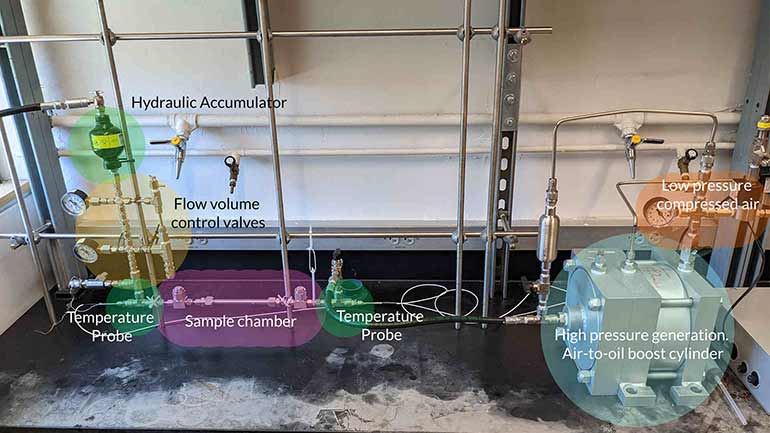Scientists build cooling system using solid refrigerants
22nd August 2022
USA: Scientists at Harvard University have built what is claimed to be a first-of-its-kind prototype cooling system using solid barocaloric refrigerants.
Barocaloric materials work similarly to traditional gas-liquid cooling systems, using pressure changes to go through heat cycles, but in this case, the pressure drives a solid-to-solid phase change. That means the material remains a solid, but the internal molecular structure changes. The key structural aspect of these barocaloric solid materials is that they contain long, flexible molecular chains that are typically floppy and disordered. But under pressure, the chains become more ordered and rigid — a change that releases heat.
Jarad Mason, the project’s principal investigator at Harvard University, describes the process of going from an ordered to a relaxed structure as “like melting wax, but without it becoming a liquid”. When the pressure is released, the material reabsorbs heat, completing the cycle.
A disadvantage of barocaloric systems, however, is that most of these materials require massive pressures to drive heat cycles. To produce these pressures, the systems need expensive, specialised equipment that’s not practical for real-world cooling applications.
Protoype
Harvard University is one of a number teams researching the use of these cheap and non-toxic organic materials.
Mason and his team recently reported barocaloric materials that can act as refrigerants at much lower pressures. They’ve now shown that the refrigerants – metal-halide perovskites – can work in a cooling system they’ve built from scratch.
“The materials we reported are able to cycle at about 3,000psi, which are pressures that a typical hydraulics system can work at,” said Adam Slavney, a chemist and materials scientist at Harvard.
The team has now built a prototype that demonstrates the use of these new materials in a practical cooling system. The device has three main parts. One is a metal tube packed with the solid refrigerant and an inert liquid — water or an oil. Another piece of the device is a hydraulic piston that applies pressure to the liquid. Finally, the liquid helps transfer that pressure to the refrigerant and helps carry heat through the system.
After solving several engineering challenges, the team has shown that the barocaloric materials work as functional refrigerants, turning pressure changes into full temperature-changing cycles.
“Our system still doesn’t use pressures as low as those of commercial refrigeration systems, but we’re getting closer,” says Mason. To the team’s knowledge, this is the first working cooling system using solid-state refrigerants that rely on pressure changes.
With the device now in hand, the team plans to test a variety of barocaloric materials. “We’re really hoping to use this machine as a testbed to help us find even better materials,” says Slavney, including ones that work at lower pressures and that conduct heat better. With an optimal material, the researchers believe solid-state refrigerants could become a viable replacement for current air conditioning and other cooling technologies.
Related stories:
Breathing MOFs exhibit huge cooling potential – 1 May 2022
SPAIN: A team from Spain’s University of Coruña have discovered that adsorbing carbon dioxide into certain metal–organic frameworks (MOFs) can create a significant cooling effect. Read more…
Solid state cooling firm secures £1.3m investment – 16 February 2022
UK: A company pioneering barocaloric cooling and refrigeration technology has secured a £1.3m investment to accelerate commercialisation of its novel technology. Read more…
Barocaloric material in line for chemical prize – 30 August 2020
UK/SPAIN: A family of hybrid organic-inorganic materials that can be used as safe and eco-friendly solid refrigerants are finalists in the Royal Society of Chemistry’s Emerging Technologies Competition. Read more…
Scientists claim solid state fridge breakthrough – 27 March 2019
CHINA: An international team of scientists claims to have found a new material that could provide a new direction for emerging solid-state refrigeration technologies. Read more…







